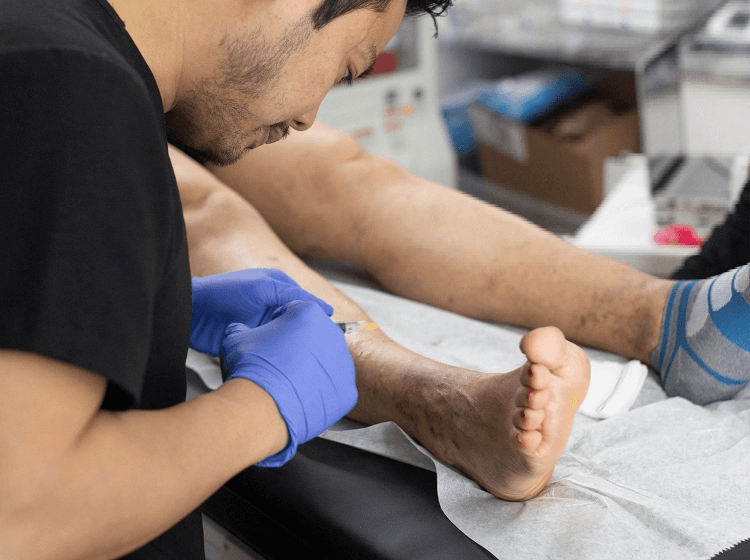Vein centers specialize in diagnosing and treating venous disorders—conditions that impact the veins and hinder normal blood flow. If you’ve ever searched “what do vein centers do,” you’re likely curious about the role these facilities play in vascular health. Vein centers, such as Vein Treatment New Jersey, are equipped with the tools, technology, and medical expertise to provide precise diagnostics and personalized treatments for vein-related conditions.
The primary goal of vein centers is to identify the root cause of symptoms like leg pain, swelling, varicose veins, or spider veins. This involves a detailed diagnostic process that includes consultations, imaging tests, and physical examinations.
Why Is Early Diagnosis of Venous Disorders Important?
Detecting venous disorders early can significantly reduce the risk of complications such as deep vein thrombosis (DVT), leg ulcers, or chronic venous insufficiency. If left untreated, these conditions can become severe and impact daily life. When patients search for “vein treatment near me,” they’re often experiencing symptoms like:
- Leg heaviness or fatigue
- Itching or burning sensations around veins
- Visible varicose or spider veins
- Swelling in the ankles or calves
- Skin discoloration
The earlier a condition is identified, the better the treatment outcome. Vein Treatment New Jersey emphasizes proactive care and diagnostic precision to ensure long-term venous health.
What Happens During Your First Visit to a Vein Center?
Your initial visit to a vein center begins with a comprehensive consultation. The vein specialist will take a detailed medical history, including any family history of venous disease, prior surgeries, pregnancies, and symptoms you’re currently experiencing. You’ll be asked questions like:
- How long have you had symptoms?
- Do symptoms worsen with prolonged standing or sitting?
- Have you noticed any skin changes or sores?
Next, a physical examination of your legs is conducted. The specialist looks for visible signs of vein issues such as bulging veins, skin texture changes, or swelling. Based on this assessment, the doctor may recommend further diagnostic imaging.
What Diagnostic Tools Do Vein Centers Use?
Vein centers use advanced, non-invasive tools to diagnose venous disorders with accuracy. These include:
- Duplex Ultrasound
This is the most common diagnostic tool used to evaluate the health of your veins. A duplex ultrasound combines traditional ultrasound and Doppler technology to create images of blood flow and vein structure.
It allows the physician to:
- Detect reflux (backward blood flow)
- Assess valve functionality
- Identify blood clots
- Map out abnormal veins for treatment planning
- Venography (in rare cases)
Though not commonly used today, venography may be utilized for complex cases. This procedure involves injecting a contrast dye into the veins and taking X-ray images. It helps in detecting blockages or detailed structural anomalies.
- Photoplethysmography (PPG)
This method measures how efficiently blood is pumped through the legs. It is often used in conjunction with ultrasound and is useful for evaluating venous insufficiency.
- CT or MR Venography
For deep vein issues or pelvic congestion syndrome, cross-sectional imaging like CT or MR venography provides a comprehensive view of venous anatomy and potential obstructions.
How Are the Results Used to Develop a Treatment Plan?
Once the diagnostic testing is complete, your vein specialist will interpret the findings and create a personalized treatment plan. This may involve a combination of lifestyle changes, minimally invasive procedures, and ongoing monitoring.
Some common treatments recommended based on diagnosis include:
- Sclerotherapy for spider veins
- Endovenous laser treatment (EVLT) or radiofrequency ablation (RFA) for varicose veins
- VenaSeal for sealing defective veins
- Compression therapy for symptom relief
Your treatment plan is guided entirely by diagnostic results, ensuring a targeted and effective approach.
Can I Get Same-Day Treatment at a Vein Center?
In many cases, if your diagnostics and evaluation are straightforward, you may be eligible for same-day treatment. Vein centers are often equipped to provide rapid procedures, especially for conditions like spider veins or mild varicose veins.
However, for more complex venous disorders, multiple visits may be necessary to complete diagnostic imaging and plan a safe, effective treatment strategy.
What Qualifications Do Vein Specialists Have?
When choosing a vein center, it’s essential to ensure the specialists are board-certified in vascular surgery, interventional radiology, or vein medicine. At reputable centers like Vein Treatment New Jersey, patients are treated by experienced professionals with years of expertise in diagnosing and managing venous disorders.
Additionally, skilled vein centers employ Registered Vascular Technologists (RVTs) who assist in conducting diagnostic tests and ensuring high-quality imaging.
How Do I Find a Trusted Vein Treatment Near Me?
With so many options available, choosing the right vein center can feel overwhelming. When searching for “vein treatment near me,” consider the following factors:
- Board-certified specialists in vascular care
- Positive patient reviews and testimonials
- Availability of advanced diagnostic tools
- Minimally invasive treatment options
- Clean, modern facilities
Vein Treatment New Jersey is a premier destination for comprehensive vein care, combining advanced diagnostics, patient-focused service, and minimally invasive treatments to restore your comfort and mobility.
Do Insurance Plans Cover Vein Diagnostics?
In most cases, diagnostic evaluations for venous disorders are covered by insurance—especially if you’re experiencing medical symptoms such as pain, swelling, or skin changes. Cosmetic treatments like spider vein removal may not be covered unless deemed medically necessary.
Before your appointment, vein centers typically help verify insurance benefits and provide an estimate of coverage so you can make informed decisions.
Final Thoughts – Trust the Experts for Early Diagnosis
Understanding how vein centers diagnose venous disorders is the first step toward reclaiming your leg health. From detailed consultations to state-of-the-art imaging, these specialized facilities provide a comprehensive approach to care. Whether you’re experiencing mild discomfort or visible vein changes, finding “vein treatment near me” and visiting a certified vein center like Vein Treatment New Jersey can lead to timely and effective solutions.
By addressing symptoms early and undergoing professional diagnostics, you not only improve your quality of life but also prevent more serious complications in the future. If you’re still asking, “What do vein centers do?”—the answer is simple: they help you feel better, move better, and live healthier.



